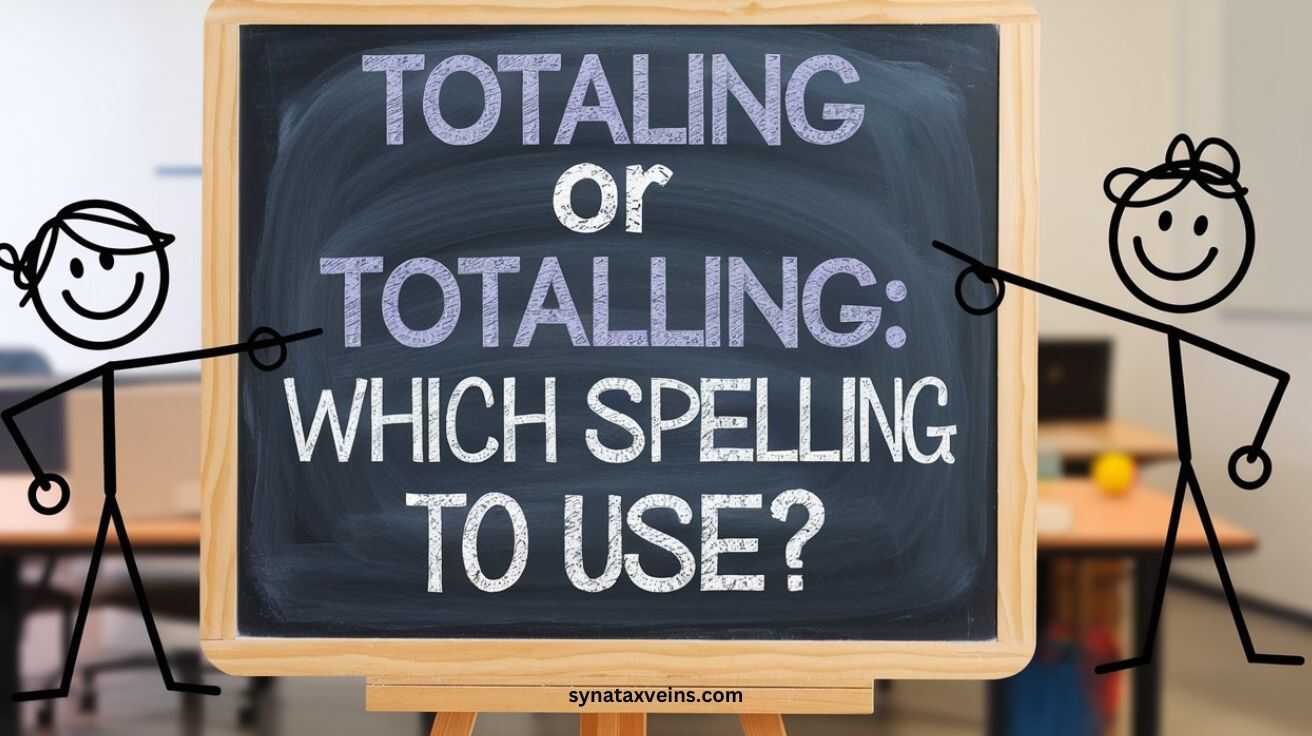When writing in English, choosing the right spelling can make a big difference, especially in professional writing. One common confusion arises between totalling vs totaling which one is correct? The answer depends on whether you’re using British English or American English. This article will clarify the difference, explore spelling rules, and provide practical examples to ensure you use the correct form based on your audience expectations.
Understanding Totalling vs Totaling
The difference between “totalling” and “totaling” is a classic case of regional spelling differences. While both words mean the same thing the process of adding up numbers or calculating a total—their spelling varies based on location. British spelling tends to double consonants before adding “-ing,” whereas American spelling often drops the extra letter.
Why the Difference Matters
Using the wrong spelling can affect clarity, especially in formal writing and professional documents. Whether you’re preparing a report, writing an email, or drafting a business proposal, choosing the correct spelling based on your audience’s language culture is crucial. Understanding these differences enhances language competence and ensures effective communication.
The Correct Spelling of Totalling or Totaling
The correct spelling depends on where your audience is:
- In the UK, Canada, and Australia: “totalling” is the correct spelling, following British spelling traditions.
- In the USA, “totaling” is the correct spelling, aligning with American spelling rules.
This difference follows the general spelling guidelines in which words ending in a single vowel + consonant double the final consonant before “-ing” in British English but not in American English.
Example:
Example Scenario: Email to a British Client
“Dear Mr. Thompson,
Our financial team is currently totalling the expenses for the quarter. The full report will be sent by Friday. Please let us know if you require any additional details.”
Example Scenario: Email to an American Client
“Dear Mr. Johnson,
Our financial team is currently totaling the expenses for the quarter. The full report will be sent by Friday. Please let us know if you require any additional details.”
As you can see, the only difference is the spelling, but using the right form improves reader expectations and communication goals.
Using “Totalling” and “Totaling” in Sentences
To help you understand the correct usage of “totalling” and “totaling”, here are examples in different contexts:
Totalling (British English)
- The accountant is totalling the company’s annual expenses.
- After totalling the votes, the election results were announced.
- The damage from the storm is totalling over £1 million.
- She spent hours totalling the invoices for the monthly report.
- The referee is totalling the scores to declare the winner.
Totaling (American English)
- He is totaling the cost of the new furniture.
- The sales department is totaling last quarter’s revenue.
- The accident resulted in damages totaling over $500,000.
- After totaling the bills, we realized we overspent this month.
- The police report lists stolen goods totaling $10,000.
These examples highlight how the spelling differs based on British vs American spelling conventions, but the meaning remains the same.
The Influence of Noah Webster
The reason for these spelling variations can be traced back to Noah Webster, an American lexicographer who wanted to simplify English spelling. His goal was to remove unnecessary letters, leading to spelling reform that distinguished US English from UK English. Thanks to Webster’s Dictionary, Americans now write “color” instead of “colour,” “honor” instead of “honour,” and “totaling” instead of “totalling.”
READ MORE >>> Casi Algo Meaning: Discover Its True Meaning and Examples
British vs American Spelling Rules
British English
In British English, words that end in a vowel + consonant double the final consonant before “-ing.” This is a traditional spelling rule followed in the UK, Australia, and other Commonwealth nations.
Examples:
- Travel → Travelling
- Cancel → Cancelling
- Total → Totalling
American English
In American English, words generally do not double the final consonant unless the stress is on the last syllable.
Examples:
- Travel → Traveling
- Cancel → Canceling
- Total → Totaling
These spelling conventions make American English more concise, aligning with Noah Webster’s approach to simplifying language.
British vs American Spelling Differences
Here’s a quick comparison of other common regional spelling differences:
| British English | American English |
|---|---|
| Centre | Center |
| Colour | Color |
| Organise | Organize |
| Defence | Defense |
| Totalling | Totaling |
Recognizing these spelling practices helps improve your language skills and adapt to different audiences.
Synonyms for Totalling/Totaling
If you want to avoid spelling confusion altogether, consider using these synonyms:
- Summing up
- Adding up
- Computing
- Calculating totals
- Reaching a sum
These alternatives ensure clarity and maintain professional writing standards.
Example in Practice
Usage in British vs American English
Publications and official documents often adhere to regional spelling rules. For example, financial reports in London will use “totalling,” while business contracts in New York will use “totaling.”
British Usage: Totalling in Accounting and Finance
In UK English, accountants use “totalling” in business writing and financial statements: “The total expenditure for the fiscal year is still totalling higher than expected.”
American Usage: Totaling in Everyday Speech
In US English, “totaling” is common in receipts and casual reports: “The cost of the groceries is totaling $120.”
Accounting and Calculating Totals
Accuracy is key in professional documents, and using the correct spelling based on your audience is essential. Whether preparing a formal report or submitting financial statements, consistency matters.
Practical Tip:
Accountant’s Report for British Audiences
“The expenses are currently totalling £50,000, with additional invoices expected by month-end.”
Accountant’s Report for American Audiences
“The expenses are currently totaling $60,000, with additional invoices expected by month-end.”
Spelling Conventions in English
Understanding spelling conventions helps maintain consistency and professionalism in writing. Whether following British English or American English, staying aware of regional preferences ensures effective communication.
Key Differences:
- British English doubles the consonant (totalling).
- American English does not double the consonant (totaling).
- Following the correct orthographic rules makes writing clear and professional.
Practical Tips for Consistency
To avoid confusion:
- Know your audience’s regional preferences.
- Use a grammar website or spell-check tool for accuracy.
- Follow the spelling norms of your company or organization.
- Stick to one spelling style in formal reports.
Totalled Vs Totaled: Which One is Right?
The correct spelling depends on regional spelling differences:
- Totalled is the correct spelling in British English.
- Totaled is the preferred spelling in American English.
Both words mean the same thing—they are the past tense and past participle of the verb “total.”
1. Spelling of “Totalled” and “Totaled”
The difference follows the same spelling conventions as totalling vs totaling:
- British English follows the double consonant spelling rule, so it uses totalled (e.g., “He totalled the expenses for the trip.”).
- American English simplifies the spelling by dropping the extra “l,” so it uses totaled (e.g., “She totaled the figures before submitting the report.”).
This pattern applies to other verbs like “cancelled/canceled” and “travelled/traveled.”
2. Verb Forms: Totalled Vs Totaled
Both words are the past tense and past participle of “total,” meaning to add up or calculate the sum of something.
- British English (Totalled)
- “He totalled the votes before announcing the winner.”
- “The accountant totalled the sales figures.”
- American English (Totaled)
- “She totaled the cost of the renovations.”
- “He totaled his car in an accident.”
In both cases, the meaning stays the same, but the spelling follows audience expectations.
3. Meaning of These Two Words
Both “totalled” and “totaled” mean:
- To calculate the sum of numbers (e.g., “He totaled his monthly expenses.”)
- To describe damage beyond repair, especially in insurance and vehicle accidents (e.g., “The car was completely totaled after the crash.”).
This spelling difference is another example of how British spelling and American spelling have evolved separately, influenced by Noah Webster and regional preferences.
Frequently Asked Questions
Is totaled one L or two?
The spelling depends on the region:
- Totaled (one “L”) is correct in American English.
- Totalled (two “L’s”) is the preferred spelling in British English.
How do you spell totalling in Canada?
In Canadian English, both totalling and totaling are accepted, but totalling (with two “L’s”) is more common due to British influence on Canadian spelling conventions.
How do you use totalling?
Totalling (or totaling) is the present participle of “total”, meaning to add up or calculate.
- Example: “She is totalling the expenses for the event.”
What is totaling in English?
Totaling (or totalling) means calculating a sum or adding up numbers. It can also mean damaging something beyond repair, especially in accidents (e.g., “His car was totaled in the crash.”).
Conclusion
In the totalling vs totaling debate, the right choice depends on your audience. If you’re writing for a British English audience, use “totalling.” For an American English audience, “totaling” is correct. Following spelling conventions ensures clarity, professionalism, and effective communication.
Whether you’re working on formal writing, improving your language skills, or drafting professional documents, using the right spelling strengthens your credibility and linguistic abilities. Always keep your audience expectations in mind, and you’ll never go wrong!

